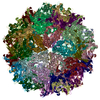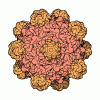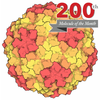+ データを開く
データを開く
- 基本情報
基本情報
| 登録情報 |  | |||||||||
|---|---|---|---|---|---|---|---|---|---|---|
| タイトル | The AAVpo.6 capsid | |||||||||
 マップデータ マップデータ | ||||||||||
 試料 試料 |
| |||||||||
 キーワード キーワード | AAVpo.6 / porcine adeno-associated virus / gene therapy / vector / cryo-EM / VIRUS | |||||||||
| 機能・相同性 | Phospholipase A2-like domain / Phospholipase A2-like domain / Parvovirus coat protein VP2 / Parvovirus coat protein VP1/VP2 / Parvovirus coat protein VP2 / Capsid/spike protein, ssDNA virus / T=1 icosahedral viral capsid / structural molecule activity / Capsid protein VP1 機能・相同性情報 機能・相同性情報 | |||||||||
| 生物種 |   Adeno-associated virus (アデノ随伴ウイルス) Adeno-associated virus (アデノ随伴ウイルス) | |||||||||
| 手法 | 単粒子再構成法 / クライオ電子顕微鏡法 / 解像度: 1.77 Å | |||||||||
 データ登録者 データ登録者 | Nelson A / Mietzsch M / McKenna R | |||||||||
| 資金援助 |  米国, 1件 米国, 1件
| |||||||||
 引用 引用 |  ジャーナル: Viruses / 年: 2025 ジャーナル: Viruses / 年: 2025タイトル: Structural and Functional Characterization of Porcine Adeno-Associated Viruses. 著者: Austin Nelson / Mario Mietzsch / Jane Hsi / Julia Eby / Paul Chipman / Robert McKenna /  要旨: Current gene therapy treatments utilizing adeno-associated virus (AAV) vectors are based on capsids of primate origin. However, pre-existing neutralizing anti-AAV antibodies, that are present in a ...Current gene therapy treatments utilizing adeno-associated virus (AAV) vectors are based on capsids of primate origin. However, pre-existing neutralizing anti-AAV antibodies, that are present in a significant portion of the population, can lead to vector inactivation and reduced therapeutic efficacy. Advances in DNA sequencing have facilitated the discovery of many AAVs from non-primate species, including isolates from pigs, which exhibit up to 50% capsid protein sequence divergence, compared to primate AAV serotypes. In this study, AAVs isolated from porcine tissues (AAVpo.1 and AAVpo.6) were selected for structural characterization due to their low capsid protein VP1 sequence identity compared to each other and to AAV9. The AAV vectors were produced via the standard triple transfection system in HEK293 cells using AAV2 to package AAV2-ITR vector genomes and were purified by iodixanol density gradient ultracentrifugation. The capsid structures of AAVpo.1 and AAVpo.6 were determined using cryo-electron microscopy and then compared to each other in addition to the AAV5 and AAV9 structures. Given that porcine AAVpo.6 has been reported to infect human cells and the ability to cross the blood-brain barrier, the functional characterization was focused on the identification of a potential glycan receptor utilized by the porcine capsids. Additionally, the porcine AAV capsid reactivity to human derived anti-AAV antibodies was assessed to evaluate the potential for these capsids to be used as alternative vectors for gene therapy, particularly for patients with pre-existing immunity to primate-derived AAV serotypes. | |||||||||
| 履歴 |
|
- 構造の表示
構造の表示
| 添付画像 |
|---|
- ダウンロードとリンク
ダウンロードとリンク
-EMDBアーカイブ
| マップデータ |  emd_49739.map.gz emd_49739.map.gz | 262.6 MB |  EMDBマップデータ形式 EMDBマップデータ形式 | |
|---|---|---|---|---|
| ヘッダ (付随情報) |  emd-49739-v30.xml emd-49739-v30.xml emd-49739.xml emd-49739.xml | 14.2 KB 14.2 KB | 表示 表示 |  EMDBヘッダ EMDBヘッダ |
| 画像 |  emd_49739.png emd_49739.png | 68.2 KB | ||
| Filedesc metadata |  emd-49739.cif.gz emd-49739.cif.gz | 5.5 KB | ||
| その他 |  emd_49739_half_map_1.map.gz emd_49739_half_map_1.map.gz emd_49739_half_map_2.map.gz emd_49739_half_map_2.map.gz | 162.6 MB 162.6 MB | ||
| アーカイブディレクトリ |  http://ftp.pdbj.org/pub/emdb/structures/EMD-49739 http://ftp.pdbj.org/pub/emdb/structures/EMD-49739 ftp://ftp.pdbj.org/pub/emdb/structures/EMD-49739 ftp://ftp.pdbj.org/pub/emdb/structures/EMD-49739 | HTTPS FTP |
-検証レポート
| 文書・要旨 |  emd_49739_validation.pdf.gz emd_49739_validation.pdf.gz | 1.1 MB | 表示 |  EMDB検証レポート EMDB検証レポート |
|---|---|---|---|---|
| 文書・詳細版 |  emd_49739_full_validation.pdf.gz emd_49739_full_validation.pdf.gz | 1.1 MB | 表示 | |
| XML形式データ |  emd_49739_validation.xml.gz emd_49739_validation.xml.gz | 16.8 KB | 表示 | |
| CIF形式データ |  emd_49739_validation.cif.gz emd_49739_validation.cif.gz | 19.9 KB | 表示 | |
| アーカイブディレクトリ |  https://ftp.pdbj.org/pub/emdb/validation_reports/EMD-49739 https://ftp.pdbj.org/pub/emdb/validation_reports/EMD-49739 ftp://ftp.pdbj.org/pub/emdb/validation_reports/EMD-49739 ftp://ftp.pdbj.org/pub/emdb/validation_reports/EMD-49739 | HTTPS FTP |
-関連構造データ
| 関連構造データ |  9nrpMC  9n5xC M: このマップから作成された原子モデル C: 同じ文献を引用 ( |
|---|---|
| 類似構造データ | 類似検索 - 機能・相同性  F&H 検索 F&H 検索 |
- リンク
リンク
| EMDBのページ |  EMDB (EBI/PDBe) / EMDB (EBI/PDBe) /  EMDataResource EMDataResource |
|---|---|
| 「今月の分子」の関連する項目 |
- マップ
マップ
| ファイル |  ダウンロード / ファイル: emd_49739.map.gz / 形式: CCP4 / 大きさ: 282.6 MB / タイプ: IMAGE STORED AS FLOATING POINT NUMBER (4 BYTES) ダウンロード / ファイル: emd_49739.map.gz / 形式: CCP4 / 大きさ: 282.6 MB / タイプ: IMAGE STORED AS FLOATING POINT NUMBER (4 BYTES) | ||||||||||||||||||||||||||||||||||||
|---|---|---|---|---|---|---|---|---|---|---|---|---|---|---|---|---|---|---|---|---|---|---|---|---|---|---|---|---|---|---|---|---|---|---|---|---|---|
| 投影像・断面図 | 画像のコントロール
画像は Spider により作成 | ||||||||||||||||||||||||||||||||||||
| ボクセルのサイズ | X=Y=Z: 0.83 Å | ||||||||||||||||||||||||||||||||||||
| 密度 |
| ||||||||||||||||||||||||||||||||||||
| 対称性 | 空間群: 1 | ||||||||||||||||||||||||||||||||||||
| 詳細 | EMDB XML:
|
-添付データ
-ハーフマップ: #1
| ファイル | emd_49739_half_map_1.map | ||||||||||||
|---|---|---|---|---|---|---|---|---|---|---|---|---|---|
| 投影像・断面図 |
| ||||||||||||
| 密度ヒストグラム |
-ハーフマップ: #2
| ファイル | emd_49739_half_map_2.map | ||||||||||||
|---|---|---|---|---|---|---|---|---|---|---|---|---|---|
| 投影像・断面図 |
| ||||||||||||
| 密度ヒストグラム |
- 試料の構成要素
試料の構成要素
-全体 : Adeno-associated virus
| 全体 | 名称:   Adeno-associated virus (アデノ随伴ウイルス) Adeno-associated virus (アデノ随伴ウイルス) |
|---|---|
| 要素 |
|
-超分子 #1: Adeno-associated virus
| 超分子 | 名称: Adeno-associated virus / タイプ: virus / ID: 1 / 親要素: 0 / 含まれる分子: all / NCBI-ID: 272636 / 生物種: Adeno-associated virus / Sci species strain: AAVpo.6 / ウイルスタイプ: VIRION / ウイルス・単離状態: STRAIN / ウイルス・エンベロープ: No / ウイルス・中空状態: No |
|---|
-分子 #1: Capsid protein VP1
| 分子 | 名称: Capsid protein VP1 / タイプ: protein_or_peptide / ID: 1 / コピー数: 60 / 光学異性体: LEVO |
|---|---|
| 由来(天然) | 生物種:   Adeno-associated virus (アデノ随伴ウイルス) Adeno-associated virus (アデノ随伴ウイルス)株: AAVpo.6 |
| 分子量 | 理論値: 59.349449 KDa |
| 組換発現 | 生物種:  Homo sapiens (ヒト) Homo sapiens (ヒト) |
| 配列 | 文字列: MASGSGAPMA DNNEGADGVG NASGNWHCDS TWLGDRVITT STRTWALPTY NNHLYKQISS QSGANNDNHY FGYSTPWGYF DFNRFHCHF SPRDWQRLIN NNWGFRPKRL NFKLFNIQVK EVTQTDGTKT IANNLTSTVQ VFADSEYQLP YVLGSAHQGC F PPFPADVF ...文字列: MASGSGAPMA DNNEGADGVG NASGNWHCDS TWLGDRVITT STRTWALPTY NNHLYKQISS QSGANNDNHY FGYSTPWGYF DFNRFHCHF SPRDWQRLIN NNWGFRPKRL NFKLFNIQVK EVTQTDGTKT IANNLTSTVQ VFADSEYQLP YVLGSAHQGC F PPFPADVF MVPQYGYLTL NNGSQAMGRS SFYCLEYFPS QMLRTGNNFT FSYTFEDVPF HSSYAHSQSL DRLMNPLIDQ YL YYLSKTQ NGLGFSQAGH NSMRDQSRNW LPGPCFRQQR ISKTPTQNNT GDFAWTGTTR YHLNGRNSAM NPGPAMASHK DDE ERFFPQ NGVLIFGKED AEKNNAVLDK VIITDEEEIR TTNPVATGEY GLVATNFQNN TTAADTEMVN AQGILPGMVW QDRD VYLQG PIWAKIPHTD GHFHPSPLMG GFGLKRPPPQ ILIKNTPVPA DPATTFNPAK LASFITQYST GQVSVEIEWE LQKEN SKRW NPEVQYTSNY NKSVNVEFTV DNNGVYSEPR TIGTRYLTRN L UniProtKB: Capsid protein VP1 |
-実験情報
-構造解析
| 手法 | クライオ電子顕微鏡法 |
|---|---|
 解析 解析 | 単粒子再構成法 |
| 試料の集合状態 | particle |
- 試料調製
試料調製
| 緩衝液 | pH: 7.4 |
|---|---|
| 凍結 | 凍結剤: ETHANE |
- 電子顕微鏡法
電子顕微鏡法
| 顕微鏡 | TFS KRIOS |
|---|---|
| 撮影 | フィルム・検出器のモデル: FEI FALCON IV (4k x 4k) 平均電子線量: 50.0 e/Å2 |
| 電子線 | 加速電圧: 300 kV / 電子線源:  FIELD EMISSION GUN FIELD EMISSION GUN |
| 電子光学系 | 照射モード: FLOOD BEAM / 撮影モード: BRIGHT FIELD / 最大 デフォーカス(公称値): 2.2 µm / 最小 デフォーカス(公称値): 0.8 µm |
| 実験機器 |  モデル: Titan Krios / 画像提供: FEI Company |
 ムービー
ムービー コントローラー
コントローラー








 Z (Sec.)
Z (Sec.) X (Row.)
X (Row.) Y (Col.)
Y (Col.)




































